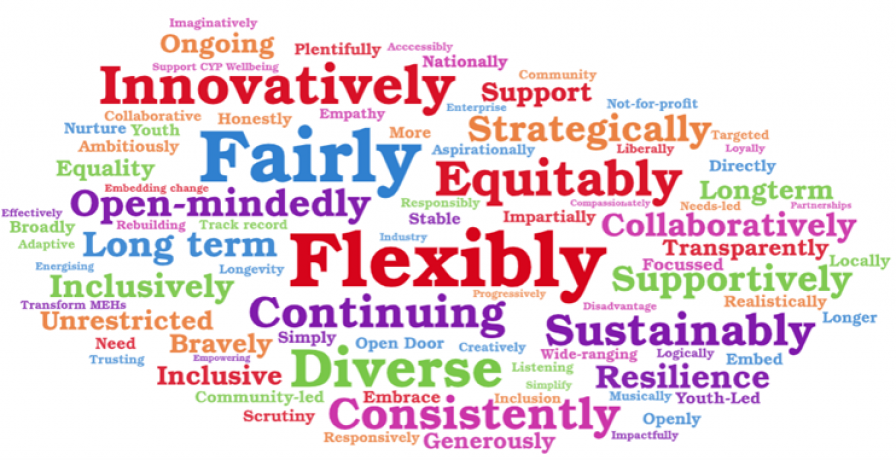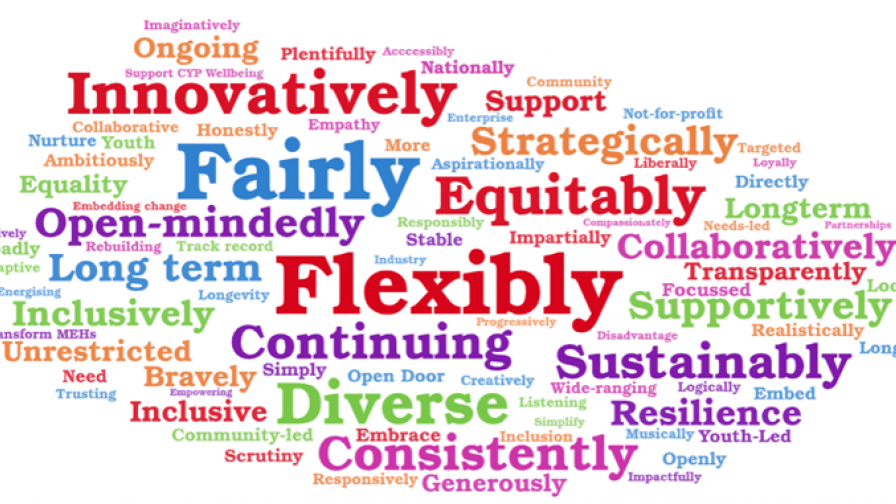Interim grants strategy update

The pandemic has changed things for young people in music, and the organisations and workforce who support them. Funders like us are in a unique position to influence what the future looks like. We’re adapting our strategy to respond to need and support people through this crisis in the best way we can. We consulted with you about the focus of our interim strategy and this blog explains our thinking so far.
Who we heard from
Thanks to all 191 people who completed the recent consultation on our interim grants strategy to March 2023.
We heard from both successful and unsuccessful applicants from all over the country. The largest group of participants were registered charities (42%). Over half (56%) of all respondents were from organisations with a turnover of £500,000 or less.
What you told us
The word cloud in the image above shows the words that sum up how you want us to fund over the next two years.
Continuity was a big theme in your responses. The vast majority seem happy with the grants programme in its current form. Between 80% and 90% of were satisfied with the current grant sizes, durations and the focus of the priority areas.
“I think that there is a great progression through the grants. The balance of funding given to length of project is right for us”.
People were generally happy with the total investment in each fund, although one fifth of people thought that there should have been a greater investment in the Emergency Fund.
The theme of continuity underpinned your responses to the question about the length of grants. We asked whether we should give out more short-term grants in order to be able to spread our investment more widely. The majority of you want us to continue with the current approach (50%) or give out longer-term grants (38%). You highlighted why this is so important:
“Having confirmed multi-year funding from Youth Music makes a big difference. We're able to make long term plans with the young people we support and measure their progress”.
“As a small organisation, having an investment in a project over a longer period of time makes a real difference to what we can deliver, to our security and to the security of the freelancers who work for us”.
Equitability
We asked how we should balance our funding allocation between new work and continuation work. This is always a tricky path to navigate within decision-making. There was a clear clustering to your responses. Sixty-two percent thought that we should fund between 60% and 70% continuation work and 30% to 40% new work.
Continuity is great, but funding can’t be a closed shop. We’ve been thinking hard about how we make our grants programme more equitable. Equality, diversity and inclusion was a consistent theme that came out across all of your responses. From levelling the playing field for young people to access opportunities, to building a diverse workforce, to giving funding equitably across different regions and organisations. The importance of supporting people with lived experience was also highlighted:
“That resources are put directly in the hands of those with lived experience rather than through 3rd parties”.
This is something we’re already trying to address. Like many sectors, the grant-making world is in need of reform. Involving people with lived experience is a major part of this. Coronavirus and the Black Lives Matter movement have expediated conversations and highlighted the urgency for change.
‘Involve people’ is one of the guiding principles underpinning the approach in our evolving strategy. You may have seen these aspirations reflected in our recent recruitment of team members, trustees, young advisors and assessors. We’ll be working with some of you more closely as we refine our funds later this year.
Core funding
We know the need for core costs and covid recovery funding is greater than ever and we’ll aim to respond to this demand over the course of the year. One of our key takeaways from the consultation is that a little bit of core funding can go a long way. We asked about the minimum amount of core funding that would make a difference to your organisation. The majority – 79% of people – placed their amounts between £10,000 and £40,000. A relatively small investment of just £10,000 would make the difference to one quarter of respondents.
“Currently we have no core funding so have to run a large amount of projects to cover our salaries and overheads. £10,000 per year would make a huge difference to us and would hopefully enable us to secure more funding with more time to develop strategically and therefore ensure the company is more stable for the future”.
When we redevelop the funds later this year, we’ll be making core funding more explicit in our guidance. If you’re making an application in the meantime, don’t be afraid to ask for what you need when it comes to overheads and operational costs. We don’t have any limits in place about the amount of overheads you can apply for. If you’re unsure about how we might view things, then speak to us before you put your budget together.
Similarly, if you’re an existing grantholder we offer flexibility to move money between different budget headings. Our coronavirus policy aims to support organisations and freelancers through the difficult phase we’re currently in.
Flexible funding
We’ve changed the way we work in the last year and have recently signed up to a collective of Flexible Funders. Through this, we are committing to being open and trusting in the way we work, because we know this makes all the difference to you:
“The approach [Youth Music] have taken to funding and grant monitoring through the last year has been kind, thoughtful, flexibly and ultimately allowed us to adapt to the crisis and meet the needs in front of us. We have felt trusted and believed-in, and this has been a lifeline through one of our most challenging years as a charity. Thank you :)”
Closing the gap between music education and music industry
As our work grows, so does our knowledge. In 2021 we published our Blueprint for the Future research and made our first round of Incubator Fund grants. Closing the gap between music education and the music industries is a feature of our work that will continue.
We’ll soon be launching our first ever fund for 18-25 year olds (or aged up to 30 for people who identify as D/deaf or Disabled). This provides progression opportunities for young adults who want to take their next steps into industry, particularly those who have been part of Fund A, B and C projects. Good progress has been made putting inclusion high up the agenda within music education. This now needs to be mirrored in the music industries so that young people from underrepresented backgrounds can progress.
What all this means
Based on what you’ve told us, we won’t be making big changes to the focus of our funding in the next couple of years. Instead, the changes will be seen in the way we make grants – the application process and how we make decisions. Being accessible and involving people are the main drivers here. Funds A and B will be refined, likely to launch sometime in autumn. Through our interim grants strategy we want to ensure that the ‘new normal’ is more inclusive, more equitable, and more diverse.
We know we need to communicate changes in good time. Rest assured, we will continue to keep you updated with our evolving plans.
In the meantime, if you have any questions or concerns then please get in touch.



